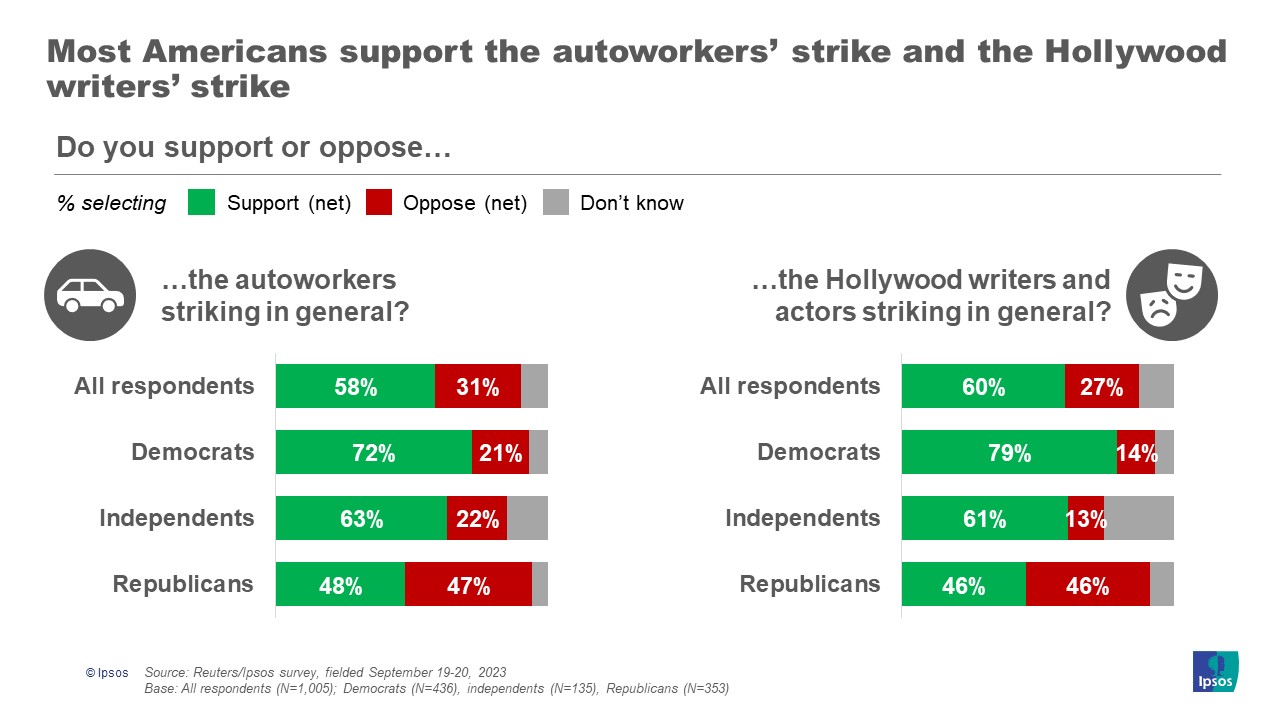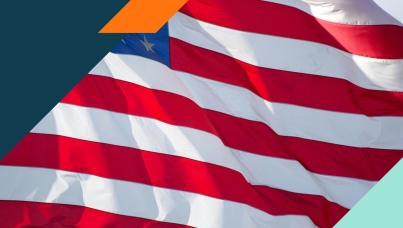Reuters/Ipsos Poll: Most Americans support the autoworkers’ strike
Washington, DC, September 21, 2023 – A new Reuters/Ipsos poll finds that most Americans support the recent UAW autoworkers’ strike, as well as the WGA Hollywood writers’ strike. More specifically, about three in five Americans say they support autoworkers or Hollywood writers striking for higher compensation. In general, the majority of Americans agree that organized labor still has a place in the American economy, and most agree that labor unions have improved the quality of life for all working Americans. When it comes to labor disputes in the last few years, Americans are more likely to say they have sided with unions than companies. Overall, Americans are generally supportive of unions and the average worker. While this sentiment is shared by most Americans, it is generally held more strongly among Democrats than Republicans.
For more information about this study, please click here.

Detailed Findings
1. A majority of Americans say they support the autoworkers’ (UAW) strike.
- Fifty-eight percent say they support the autoworkers striking in general. A majority of Democrats (72%) and independents (63%) share this sentiment, but Republicans are more split on the issue (48% support, 47% oppose).
- While a majority of Americans—regardless of age, household income, race/ethnicity—support the autoworkers striking in general, Americans ages 18-34, those with a household income under $100k, and Black Americans are especially likely to agree.
- More than half (57%) of Americans say they support autoworkers striking to return to a defined-benefit pension retirement plan rather than 401(k) plans funded by their own contributions. Fifty-five percent say they support autoworkers striking to demand a higher share of company profits, including a 40% pay raise over four years.
2. Similarly, most Americans say they support the Hollywood writers’ (WGA) strike.
- Three in five (60%) say they support Hollywood writers and actors striking in general. As with the autoworkers’ strike, Democrats (79%) and independents (61%) are more likely to say they support the Hollywood writers’ strike than Republicans (46%).
- Another 60% say they support Hollywood writers and actors striking to demand higher compensation. Nearly seven in ten (67%) say they support them striking to demand limits on the use of AI in creating TV shows and movies.
3. In labor disputes from the last few years, Americans are more likely to say they have sided with unions rather than companies. On many issues, most Americans, regardless of party affiliation, say they support the average worker over large companies.
- When asked about labor disputes over the last two or three years, a plurality (32%) of Americans say they have sided with unions while just 14% say they have sided with companies. About one-fifth say they felt sympathies for them both (17%) or neither (20%), while 17% say they had no opinion.
- Democrats are much more likely to say they sided with the unions (53%) rather than companies (4%), while Republicans have a less unified view, with 18% siding with unions, 25% siding with companies, and 23% siding with neither.
- Sixty-nine percent of Americans say they support workers striking to seek a higher share of profits their companies earn. About four in five Democrats (84%), 65% of independents, and 58% of Republicans share this sentiment.
- While a majority of Americans, regardless of age or household income, say they support workers striking to seek a higher share of profits their companies earn, Americans aged 55+ (27%) and those with a household income of $100k or higher (27%) are more likely to say they oppose workers doing so than younger Americans or Americans with a household income below $100k, respectively.
- Two-thirds of Americans (66%) say they agree that pay raise percentages and bonuses for the average worker and executive should be aligned so that if a CEO receives a 25% raise, the average worker would also see a 25% raise. Again, most Americans across party lines share this sentiment, including 76% of Democrats, 62% of Republicans, and 62% of independents.
4. More generally, Americans largely recognize the historical importance of labor unions, and a majority agree that organized labor still has a place in the American economy. That said, most Americans—across party lines—consider labor unions beneficial for all working Americans.
- Most Americans (70%), regardless of party affiliation, agree with the statement that the middle class and unions built the United States, not Wall Street.
- Seven in ten (70%) Americans agree that organized labor still has a place in the American economy. Seventy-six percent of Democrats agree, while 67% of Republicans and 67% of independents agree.
- Three in five (61%) Americans agree that labor unions have improved the quality of life for all working Americans. This majority sentiment exists regardless of party affiliation, as 66% of Democrats, 63% of independents, and 56% of Republicans agree.
- In fact, a plurality of Americans (46%) agree that they would be willing to go on strike to improve compensation and working conditions even if it meant lost wages to them personally. However, Democrats are more likely to agree with this than Republicans or independents (64% vs. 36% and 40%, respectively).
About the Study
These are some of the findings of an Ipsos poll conducted between September 19-20 , 2023 on behalf of Thomson Reuters. For this survey, a sample of 1,005 adults age 18+ from the continental U.S., Alaska, and Hawaii was interviewed online in English. The sample also includes 436 Democrats, 353 Republicans, and 135 independents.
The sample was randomly drawn from Ipsos’ online panel, partner online panel sources, and “river” sampling and does not rely on a population frame in the traditional sense. Ipsos uses fixed sample targets, unique to each study, in drawing a sample. After a sample has been obtained from the Ipsos panel, Ipsos calibrates respondent characteristics to be representative of the U.S. Population using standard procedures such as raking-ratio adjustments. The source of these population targets is U.S. Census 2022 American Community Survey data. The sample drawn for this study reflects fixed sample targets on demographics. Post hoc weights were made to the population characteristics on gender, age, race/ethnicity, region, education and political party affiliation.
Statistical margins of error are not applicable to online non-probability polls. All sample surveys and polls may be subject to other sources of error, including but not limited to coverage error and measurement error. Where figures do not sum to 100, this is due to the effects of rounding. The precision of Ipsos online polls is measured using a credibility interval. In this case, the poll has a credibility interval of plus or minus 3.8 percentage points for all respondents. Ipsos calculates a design effect (DEFF) for each study based on the variation of the weights, following the formula of Kish (1965). This study had a credibility interval adjusted for design effect of the following (n=1,005, DEFF=1.5, adjusted Confidence Interval=+/-5.3 percentage points).
The poll also has a credibility interval of plus or minus 5.7 percentage points for Democrats, plus or minus 6.4 percentage points for Republicans, and plus or minus 10.3 percentage points for independents.
For more information on this news release, please contact:
Chris Jackson.
Senior Vice President, U.S.
Public Affairs
Annaleise Azevedo Lohr
Director, U.S.
Public Affairs
About Ipsos
Ipsos is one of the largest market research and polling companies globally, operating in 90 markets and employing over 18,000 people.
Our passionately curious research professionals, analysts and scientists have built unique multi-specialist capabilities that provide true understanding and powerful insights into the actions, opinions and motivations of citizens, consumers, patients, customers or employees. Our 75 solutions are based on primary data from our surveys, social media monitoring, and qualitative or observational techniques.
Our tagline "Game Changers" sums up our ambition to help our 5,000 customers move confidently through a rapidly changing world.
Founded in France in 1975, Ipsos has been listed on the Euronext Paris since July 1, 1999. The company is part of the SBF 120 and Mid-60 indices and is eligible for the Deferred Settlement Service (SRD).ISIN code FR0000073298, Reuters ISOS.PA, Bloomberg IPS:FP



